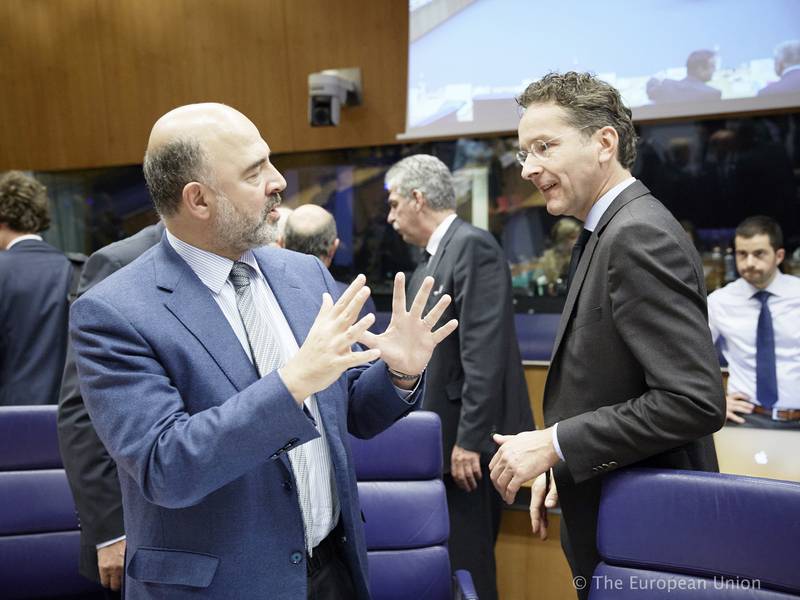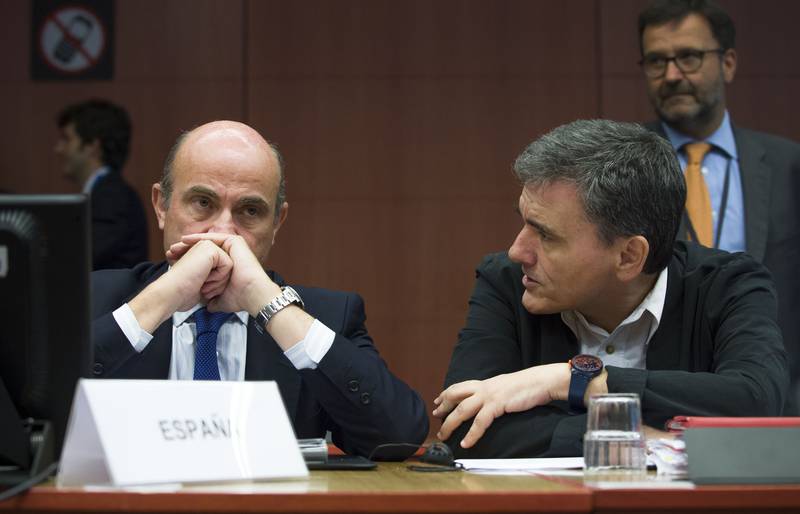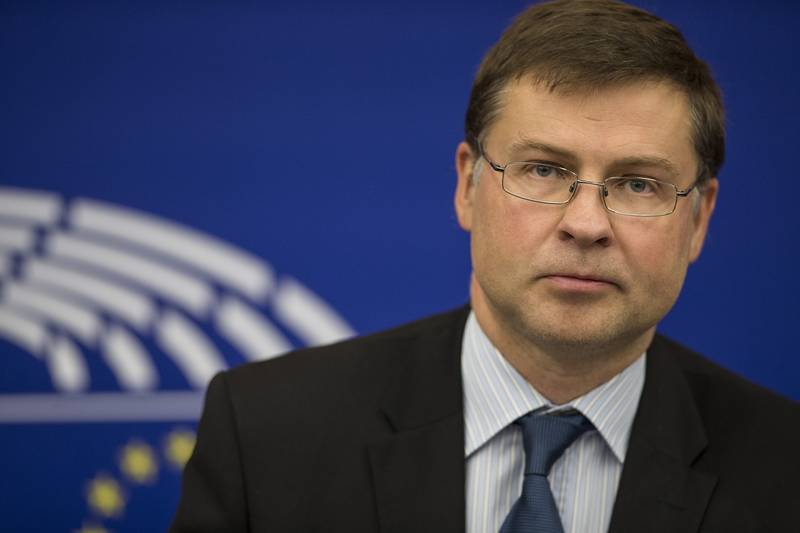Pierre Moscovici Went Too Far with EC's Politicising
Adelina Marini, October 9, 2015
 Jean-Claude Juncker came to power with the promise to remake the purely technocratic, bureaucratic, and clerical body into a slightly more-political European Commission. A year later, the Commission is becoming too political. This is most obvious in the European semester and especially in the part concerning the euro area, for integration there is quite strong. According to European law, member states of the euro area are obliged to present their budgetary plans for next year to the EC by October 15th. The EC then performs a thorough analysis of these budgets and comes out with an opinion. The states, whose budgetary plans deviate too much from the set framework, receive warnings and possibly sanctions. Penalties, however, have not been dealt so far. The first state that “deserved” to be sanctioned for regular breach of EU fiscal rules was France, but the EC was "merciful" and gave it the third extension in a row.
Jean-Claude Juncker came to power with the promise to remake the purely technocratic, bureaucratic, and clerical body into a slightly more-political European Commission. A year later, the Commission is becoming too political. This is most obvious in the European semester and especially in the part concerning the euro area, for integration there is quite strong. According to European law, member states of the euro area are obliged to present their budgetary plans for next year to the EC by October 15th. The EC then performs a thorough analysis of these budgets and comes out with an opinion. The states, whose budgetary plans deviate too much from the set framework, receive warnings and possibly sanctions. Penalties, however, have not been dealt so far. The first state that “deserved” to be sanctioned for regular breach of EU fiscal rules was France, but the EC was "merciful" and gave it the third extension in a row.
At that time the EC resorted to a number of tricks to justify why Paris is once again getting leniency and “flexibility” while at the same time the euro area literally started a war with Greece. This autumn the magnitude of politicisation was so large that it broke up the Commission politically. On Monday, after the regular meeting of the Eurogroup, European Commissioner for Economic and Financial Affairs Pierre Moscovici (France, Socialists and Democrats) sent the journalist society in shock by announcing that the EC will deviate from the agreed deadlines for review of budgetary plans with Spain because of the elections. Instead of waiting for the budgets of all 19 euro area members to be handed in and only then giving its first assessment, based on the autumn economic forecast, Pierre Moscovici stated that the EC will give its official opinion on Spain’s budgetary plan on the following day (October 6th).
Spain was the first to hand in its budgetary plan – on September 11th. The EC prepared especially for Spain an economic prognosis, which is to serve as a basis for the Commission’s opinion. Something that has not been done for Finland or Latvia, who also handed in their plans ahead of schedule, Finland on September 28th and Latvia on the 30th. Mr Moscovici asked himself the question why this is being done and answered it: “So that it [the opinion] could be taken into account before the central government budget is adopted by the parliament later this month. I think the parliament will close for election time at the latest the 21 October.” As if fully aware of the political bomb he just threw Pierre Moscovici “leaked” what the opinion will say. “On the basis of this forecast the Commission assessment confirms the risk of non-compliances with the Pact in both 2015 and 2016 which we highlighted already in spring”, he said. In the spring, when the EC published the country-specific recommendations (CSR) to all member states, to Spain the Commission wrote that it expected that the government would fail to meet its targets for correction of the excessive budget deficit.
At the moment, Spain is in the corrective arm of the fiscal rules, which means it is subject to sanctions if it does not comply with the timeframe agreed in the Council. This year the Spanish government was supposed to lower the budget deficit to 4.2% of GDP and below the 3-percent benchmark next year – to 2.8% of GDP. Based on the spring economic forecast the EC expected that Spain would not be able to reach its targets and this year’s deficit will be 4.5% and 3.5% next year. Thus the first country-specific recommendation to Spain was to ensure a “durable correction of the excessive deficit by 2016 by taking the necessary structural measures in 2015 and 2016 and using windfall gains to accelerate the deficit and debt reduction”. According to the national reform programme of Spain, public debt was expected to  peak this year at 98.9% of GDP and start to gradually decrease next year to 93.2%.
peak this year at 98.9% of GDP and start to gradually decrease next year to 93.2%.
On October 5th, Pierre Moscovici confirmed his spring expectations in stating that Spain would miss its fiscal targets by 0.3% this year and 0.7% next year, making budget deficit 4.5% instead of 4.2% this year and 3.5% instead of 2.8% in 2016. In his words, the EC’s opinion will invite Spanish authorities to strictly execute the 2015 budget and to take the necessary measures for next year. Moreover, Moscovici urged Spanish authorities to reconsider their budgetary plan for 2016 and submit an updated one to the EC shortly after a new government has taken office. It is not clear why a special forecast is done for Spain, nor what it is based on. The autumn economic forecast of the EC will be presented later this month, but it is unlikely it will differ significantly from the expectations of the International Monetary Fund. The IMF has already announced its expectations for this autumn and they are way lower than the spring economic moods.
In such a situation, Pierre Moscovici’s actions seem really inexplicable, except as an attempt at securing support for the Spanish socialists. Parliamentary elections will be held in Spain on December 20th. According to this week’s polls, the centre-right People’s Party of Prime Minister Mariano Rajoy is in the lead with 27%, followed by the Socialist Party with 21.9%. The Spanish far-left populist party Podemos is fourth with 14.8%. The results in the Portugal elections last Sunday showed that the Portuguese prefer security. They re-elected right-wing PM Pedro Coelho, despite the fact that under his government Portugal went through a heavy adjustment programme that was announced successful by the EC, ECB, and the Eurogroup. It was this one and other similar election results that prompted many analysts to conclude that throughout the EU voters prefer austerians to the uncertainty of the new, or even old left formations.
On October 6th, Commission spokesperson Annika Breidthardt confirmed that the opinion on Spain would be presented as Pierre Moscovici promised. This was supposed to happen around 1530 hrs CET. At the same time there was a meeting of the College (Commission) in Strasbourg, after which the Vice-President of the Commission in charge of the euro, Valdis Dombrovskis (Latvia, EPP), announced that there was still no decision on the opinion on Spain and that discussions in the College were ongoing. “We expect it to be finalised in the coming days”, he said without committing to an exact deadline. And on Wednesday noon (October 7th), EC spokesperson Margaritis Schinas added that the discussions were still going on, hinting that a decision could be expected at the College’s next week meeting (Wednesday).
Pierre Moscovici’s decision to have an emergency opinion on Spain, based on an emergency and national autumn economic forecast, because of the coming elections there, was discussed at the meeting of the Eurogroup as well. Its boss Jeroen Dijsselbloem (The Netherlands, Socialists and Democrats) stated that the group of  the financial ministers of the euro area would be discussing the budget plans and the EC’s opinion on them as planned – on November 23rd. He refused more comments on the subject.
the financial ministers of the euro area would be discussing the budget plans and the EC’s opinion on them as planned – on November 23rd. He refused more comments on the subject.
The conclusion from the current situation is that politicising the EC involves a number of risks. The structure of the Juncker Commission is based on portfolio circles. The economic circle contains several Commissioners and at least three vice-presidents. This way domestic political and national control is secured. The question is whether this structure will manage to prevent the discrediting of this key EU body in the execution of its most important function – abiding by the law and commitments made, for the EC is known not only as the EU “government” or “executive body of the EU”, but also as the “guardian of treaties”.
Translated by Stanimir Stoev
 Klaus Regling | © Council of the EU
Klaus Regling | © Council of the EU Mario Centeno | © Council of the EU
Mario Centeno | © Council of the EU Mario Centeno | © Council of the EU
Mario Centeno | © Council of the EU